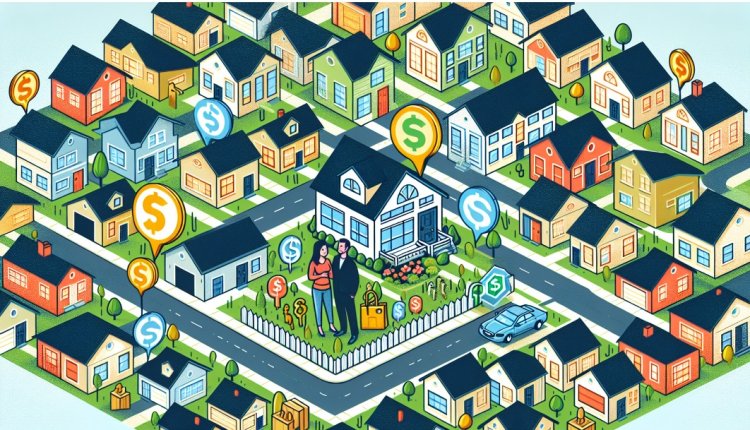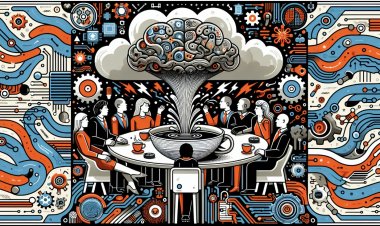How to Live Without a Mortgage Payment: Exploring the House Hacking Loophole
Ditch the mortgage blues! Master the "house hacking" loophole and unlock rent-free living through strategic property ownership. Dive into this unconventional guide and say goodbye to monthly burdens!

Introduction
House hacking is a concept that allows you to own a home without having to make a housing payment out of your pocket. For most people, their housing payment is their biggest monthly expense. But with house hacking, you can find a loophole in the system and have someone else pay your loan. In this video, we will explore the house hacking loophole and how you can live without a housing payment.
Before we dive into the details, I encourage you to watch the video till the end to fully understand this concept. And don't forget to smash the thumbs-up button to support our financial news and education videos.
Understanding the Concept of House Hacking
House hacking is a concept that allows you to own a home without having to make a housing payment out of your pocket. For most people, their housing payment is their biggest monthly expense. But with house hacking, you can find a loophole in the system and have someone else pay your loan. In this section, we will explore the concept of house hacking and how it can help you live without a housing payment.
Definition of home in financial terms
In financial terms, a home is a property that you own and live in. It can be a single-family house, a condo, an apartment, or even a mobile home. The key is that it is a place where you reside and consider your primary residence.
Different types of homes and properties
There are various types of homes and properties that you can choose from. These include single-family homes, multi-family buildings, condos, and apartments. Each type of property offers its own advantages and considerations, depending on your goals and financial situation.
The challenge of buying a home with cash
Buying a home with cash can be a challenge for most people, as it requires a significant amount of money upfront. Most individuals do not have enough cash readily available to purchase a home outright, which is why they turn to mortgages to finance their purchase.
The role of mortgages in the home buying process
Mortgages play a crucial role in the home-buying process. They allow individuals to borrow money from a bank or lender to purchase a home. The borrowed amount is then paid back over a specified period of time, usually 15 or 30 years, along with interest.
The House-Hacking Loophole
House hacking is a concept that allows you to own a home without having to make a housing payment out of your pocket. For most people, their housing payment is their biggest monthly expense. But with house hacking, you can find a loophole in the system and have someone else pay your loan.
House hacking is essentially when you purchase a property and rent out a portion of it to cover your mortgage payment. This allows you to live in your own home without having to make a housing payment.
Four benefits of using the house hacking loophole:
-
Cheaper loan options for primary residences: When you use the house hacking loophole, you can take advantage of cheaper loan options that are typically available for primary residences. This can result in lower interest rates and monthly payments.
-
Alternative financing options like FHA loans: If you don't have a large down payment saved up, you can still qualify for a mortgage through alternative financing options like FHA loans. These loans have lower down payment requirements, making it easier to get started with house hacking.
-
Tax benefits: House hacking can provide tax benefits, such as deductions for mortgage interest, property taxes, and depreciation. These deductions can help lower your overall tax liability and increase your potential profit.
-
Profit potential: By renting out a portion of your property, you can generate rental income that can offset your mortgage payment and potentially even provide a profit. This extra income can be used to pay down debt, save for future investments, or increase your financial flexibility.
Overall, house hacking offers a unique opportunity to live in your own home without the burden of a housing payment. It allows you to leverage real estate to your advantage, taking advantage of cheaper loan options, alternative financing, tax benefits, and profit potential. If you're looking to reduce your housing expenses and increase your financial freedom, house hacking may be a viable option to consider.
Calculating the costs and returns
When considering house hacking as a way to live without a housing payment, it's important to understand the costs and returns associated with the process. Let's take a look at an example of a 4-unit multifamily building to better understand the financial implications.
When purchasing a 4-unit multifamily building, you would typically need a mortgage to finance the purchase. The mortgage payments would be based on the purchase price of the property and the interest rate of the loan. Comparing these mortgage payments to the rental income you can generate from the property will give you an idea of the potential returns.
However, it's important to consider additional expenses like property taxes and vacancies. Property taxes can vary depending on the location, and vacancies can occur when one or more units are unoccupied. These expenses will need to be factored into your calculations to determine the true profitability of the property.
To calculate your monthly profit, you would subtract the mortgage payments, property taxes, and estimated vacancies from the rental income. This will give you an idea of how much money you can expect to make each month from the property.
Building equity is another important aspect of house hacking. As you make mortgage payments, a portion of each payment goes towards paying down the principal balance of the loan. This builds equity in the property, which can be a valuable asset in the long run.
Lastly, it's worth exploring options for low down payment or no down payment mortgages. Programs like FHA loans can provide financing with lower down payment requirements, making it easier to get started with house hacking. These options can help reduce the upfront costs of purchasing a property.
Overall, calculating the costs and returns of house hacking is essential for understanding the financial implications of the strategy. By considering factors like mortgage payments, rental income, expenses, and equity building, you can make informed decisions about whether house hacking is the right choice for you. Exploring options for low down payment or no down payment can also help make house hacking more accessible for those with limited upfront funds.
Expanding the House Hacking Strategy
House hacking is an effective strategy for living without a housing payment, and there are various ways to expand and maximize its benefits. Here are some ways to take house hacking to the next level:
Multi-level house hacking
Consider purchasing a multi-level property and renting out different units or floors. This allows you to generate more rental income and potentially live rent-free in your own home.
Using primary residence units as rentals
If you have extra rooms or units in your primary residence, you can rent them out to tenants while still living on the property. This allows you to offset your mortgage payment and generate passive income.
The benefits of refinancing and repeating the process
Once you have built equity in your property through house hacking, you can consider refinancing to lower your interest rate or access additional funds for future investments. By repeating the house hacking process with multiple properties, you can continue to build wealth and generate passive income.
Potential for multiple investment properties
House hacking can be a stepping stone to acquiring multiple investment properties. By using the strategy to generate income and build equity, you can leverage your assets to purchase additional properties and further expand your real estate portfolio.
Creating passive income and building wealth
Through house hacking, you can create passive income by having tenants cover your housing expenses. This not only allows you to live without a housing payment but also helps you build wealth through real estate appreciation and rental income.
Expanding the house hacking strategy offers numerous benefits, including the potential for multiple investment properties, generating passive income, and building wealth. By maximizing the potential of house hacking, you can reduce your housing expenses and increase your financial freedom.
Considering Other Investment Opportunities
When it comes to managing your finances, it's important to consider all the investment opportunities available to you. While house hacking can be a great way to reduce your housing expenses, it's also important to explore other options and weigh the pros and cons. Here are some factors to consider:
-
Should you use extra cash to pay down your mortgage? Paying down your mortgage can be a good idea if you want to reduce your debt and own your home outright. However, it's important to consider your financial goals and risk tolerance before making this decision.
-
Factors to consider: financial goals and risk tolerance Before deciding whether to pay down your mortgage or explore other investment options, it's crucial to evaluate your financial goals and risk tolerance. Are you looking to reduce your debt, increase your savings, or generate passive income? Understanding your goals will help guide your investment decisions.
-
Benefits and cons of paying down your home Paying down your mortgage can provide financial security and peace of mind. It can also reduce your interest payments and build equity in your home. However, by using extra cash to pay down your mortgage, you may miss out on potential investment opportunities that could offer higher returns.
-
Exploring different investment options Instead of solely focusing on paying down your mortgage, consider exploring other investment options. This could include investing in stocks, real estate properties, or starting your own business. Each investment option has its own risks and potential rewards, so it's important to do thorough research and consider working with a financial advisor.
-
Emphasising the importance of financial education No matter what investment option you choose, it's crucial to educate yourself about personal finance and investing. Understanding different investment strategies, managing risk, and staying informed about market trends will help you make informed decisions and maximise your returns.
Ultimately, the decision to use extra cash to pay down your mortgage or explore other investment opportunities depends on your individual financial situation and goals. It's important to evaluate your options, weigh the potential benefits and risks, and make a decision that aligns with your long-term financial objectives.
Getting a Mortgage: The Right Way
When it comes to buying a home, getting a mortgage is often an essential part of the process. However, it's important to approach the mortgage process the right way to ensure that you make informed decisions and secure the best terms possible. Here are some key points to consider:
Importance of pre-qualification and being prepared
Before you start looking at homes or making offers, getting pre-qualified for a mortgage is crucial. This involves working with a lender to determine how much you can afford to borrow based on your income, credit score, and debt-to-income ratio. Being pre-qualified shows sellers that you are a serious buyer and can give you an edge in a competitive market.
Proof of income and assets
When applying for a mortgage, you will need to provide proof of income and assets to the lender. This typically includes documents such as tax returns, pay stubs, and bank statements. Having these documents organised and readily available can help streamline the application process.
Understanding the debt-to-income ratio
Your debt-to-income ratio (DTI) is a crucial factor that lenders consider when determining your eligibility for a mortgage. This ratio compares your monthly debt payments to your gross monthly income. Ideally, lenders prefer a DTI ratio of 36% or lower. To improve your DTI ratio, you can pay down existing debts or consider increasing your income.
Credit score requirements and impact on interest rates
Your credit score plays a significant role in the mortgage process. A higher credit score typically results in a lower interest rate, which can save you thousands of dollars over the life of your loan. It's important to check your credit score and address any errors or negative factors before applying for a mortgage.
Tips for boosting credit score
If your credit score is lower than desired, there are several steps you can take to improve it. These include paying bills on time, reducing credit card balances, and disputing any errors on your credit report. It's also important to avoid applying for new credit or taking on additional debt before applying for a mortgage.
By following these guidelines and being proactive in the mortgage process, you can increase your chances of securing a mortgage with favorable terms. Remember to do your research, shop around for the best rates, and work with a reputable lender to ensure a smooth and successful mortgage experience.
Types of Mortgages
When it comes to securing a mortgage, there are several different types to consider. Understanding the differences between these mortgage options can help you make an informed decision about which one is right for you. Here are some common types of mortgages:
Fixed-rate mortgages
A fixed-rate mortgage is a type of mortgage where the interest rate remains the same throughout the entire term of the loan. This means that your monthly mortgage payments will also remain constant. Fixed-rate mortgages provide stability and predictability, making them a popular choice for many homeowners.
Pros of Fixed-Rate Mortgages:
-
Interest rates stay the same, providing predictability in monthly payments.
-
It can be beneficial if interest rates are expected to rise in the future.
Cons of Fixed-Rate Mortgages:
-
May have higher interest rates compared to adjustable-rate mortgages (ARMs) at the start of the loan.
-
There is less flexibility compared to ARMs if you plan to sell or refinance before the end of the loan term.
Adjustable Rate Mortgages (ARMs)
An adjustable rate mortgage, or ARM, is a type of mortgage where the interest rate can fluctuate over time. Typically, ARMs have a fixed interest rate for an initial period, such as five or seven years, and then the rate adjusts periodically based on market conditions. The adjustment period is usually one year.
Risks and considerations of ARMs:
-
Interest rates can increase after the initial fixed-rate period, leading to higher monthly payments.
-
ARMs are more suitable for homeowners who plan to sell or refinance before the adjustable rate period begins.
Conventional Mortgages vs. Government Mortgages
There are also differences between conventional mortgages and government mortgages.
Conventional Mortgages:
-
The government does not insure or guarantee conventional mortgages.
-
They typically require a higher down payment and have stricter qualification criteria.
-
Private lenders such as banks and credit unions offer conventional mortgages.
Government Mortgages:
-
Government organizations like the Federal Housing Administration (FHA), the United States Department of Agriculture (USDA), or the Department of Veterans Affairs (VA) insure or guarantee government mortgages.
-
These mortgages often have more flexible qualification criteria and lower down payment requirements.
-
Government mortgages are designed to help certain groups, such as first-time homebuyers, low-income individuals, or veterans, achieve homeownership.
Overview of FHA, USDA, and VA Loans
FHA Loans:
-
The Federal Housing Administration insures FHA loans.
-
They are popular among first-time homebuyers because they have lower down payment requirements and more lenient credit score criteria.
-
FHA loans also allow for higher debt-to-income ratios compared to conventional mortgages.
USDA Loans:
-
The United States Department of Agriculture offers USDA loans.
-
They are designed to help individuals in rural areas achieve homeownership.
-
USDA loans often have zero-down payment options and lower interest rates than conventional mortgages.
VA Loans:
-
Veterans, active-duty service members, and qualified surviving spouses can apply for VA loans, which the Department of Veterans Affairs guarantees.
-
These loans typically have no down payment requirements and offer competitive interest rates.
Understanding the different types of mortgages available can help you make an informed decision about which option is best suited to your needs and financial situation. It's important to carefully consider the pros and cons of each type and choose the one that aligns with your long-term goals and preferences.
Factors Affecting Mortgage Rates
When it comes to getting a mortgage, there are several factors that can affect the interest rate you will receive. Understanding these factors will help you make informed decisions and potentially save money. Here are some key factors to consider:
Understanding the impact of fixed-rate vs. adjustable-rate mortgages
The type of mortgage you choose can have a significant impact on your interest rate. Fixed-rate mortgages have a set interest rate for the entire term of the loan, providing stability and predictability. Adjustable-rate mortgages (ARMs), on the other hand, have an interest rate that can fluctuate over time, potentially resulting in higher or lower monthly payments.
Role of interest rates set by the Federal Reserve Bank
The Federal Reserve Bank plays a crucial role in determining interest rates. When the Federal Reserve raises or lowers interest rates, it can directly impact the interest rates offered by lenders. It's important to keep an eye on these rates and understand how they can affect your mortgage rate.
Credit score and down payment requirements
Your credit score and down payment amount can also impact your mortgage rate. Lenders typically offer lower interest rates to borrowers with higher credit scores and larger down payments. It's important to maintain a good credit score and save for a sufficient down payment to secure the best possible interest rate.
Mortgage term length and risk assessment
The length of your mortgage term can influence your interest rate. Shorter-term mortgages, such as 15-year loans, often have lower interest rates compared to longer-term mortgages, like 30-year loans. Lenders also assess the risk associated with your loan, taking into account factors such as your income, employment history, and debt-to-income ratio.
The importance of shopping around for the best interest rate
It's crucial to shop around and compare offers from multiple lenders to ensure you're getting the best interest rate possible. Different lenders may offer different rates and terms, so taking the time to research and compare can save you thousands of dollars over the life of your loan. Make sure to consider both national and local lenders to explore all your options.
By understanding these factors and taking the time to research and compare offers, you can increase your chances of securing a mortgage with a favorable interest rate. Remember to consider your financial goals, credit score, down payment amount, and the length of your loan when making decisions about your mortgage. Shopping around and staying informed will help you make the best choice for your financial situation.
Knowing What You Can Afford
When it comes to buying a home and getting a mortgage, it is essential to know what you can afford. Taking responsibility for determining affordability is crucial in order to make informed decisions and avoid financial strain in the long run.
Understanding your financial limits is important before jumping into the home-buying process. This involves evaluating your income, expenses, and overall financial situation. By knowing your limits, you can ensure that you are not overextending yourself and taking on more debt than you can handle.
It is important to differentiate between monthly payments and overall costs. While a lower monthly payment may seem more affordable, it is essential to consider the overall cost of the mortgage, including interest and other fees. This will give you a clearer picture of the long-term financial commitment.
Considerations for long-term mortgage commitments should also be taken into account. Owning a home is a long-term commitment, and it is important to consider factors such as job stability, future financial goals, and potential changes in income. This will help ensure that you can comfortably afford your mortgage for the foreseeable future.
Shopping around for the best mortgage deal is highly encouraged. Different lenders offer different rates and terms, and it is important to compare options to find the best deal for your specific financial situation. This can help save money in the long run by securing a lower interest rate or better loan terms.
By taking responsibility for determining affordability, understanding financial limits, differentiating between monthly payments and overall cost, considering long-term commitment, and shopping around for the best mortgage deal, you can make informed decisions and ensure that you are choosing a mortgage that aligns with your financial goals and capabilities.



 admin
admin 










